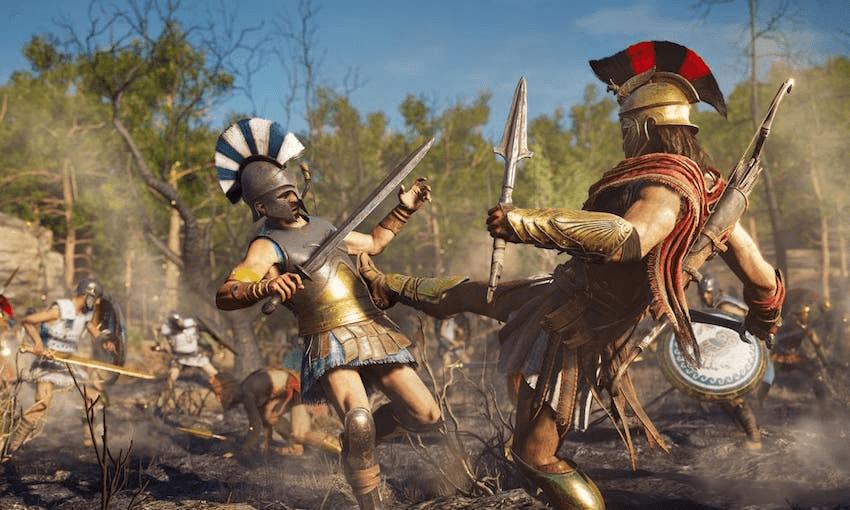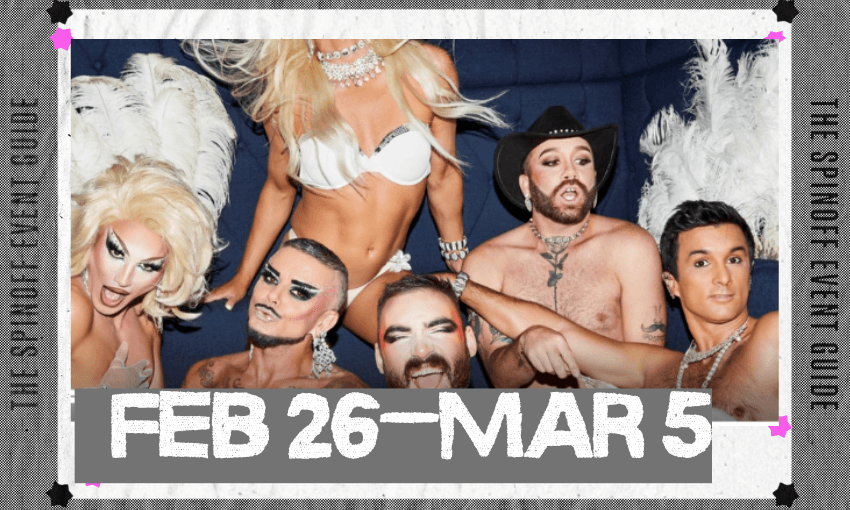It’s time for the annual Assassin’s Creed game, but 2018’s version doesn’t feel very much like an Assassin’s Creed at all. So why does it work so well? Sam Brooks reviews.
The first Assassin’s Creed blew my mind eleven years ago. It was the first game that proved the power of the last generation’s consoles: it was a genuine graphical breakthrough, and the game was initially more immersive than any open world game had been up until that point. It was the peak mix of stealth, action, open world and faux-profound storytelling. Most importantly, it let you play as an assassin and kill people. People really like playing as an assassin, apparently.
I was hooked. It was only after a couple dozen hours of playing that my rose glasses started to chip, and the seams started to show. The open world was shallow, the side missions were endlessly repetitive, the storytelling was not faux-profound but straight up high school level historical fanfiction. Like many triple-A games before and since, Assassin’s Creed had duped us.
The succeeding decade has been a dicey one for the series, despite no significant drops in sales or reviews. The meta-narrative has twisted itself into an absolute mess, yearly installments have meant that the advances in gameplay and graphics have been minute, and the stories have never really lifted themselves beyond the level of very expensive and very shallow historical fanfiction.
In fact, the most critically successful steps that the games have taken are the ones that take them the furthest away from the original premise of the game: stabbing people without being held accountable for it. The first came in Assassin’s Creed IV, which introduced naval battles, allowing you to fulfill your high-sea-roaming fantasies, and the second comes now with Assassin’s Creed: Odyssey, which straight up just does its best to copy The Witcher 3 – and pretty much succeeds.
Cast your mind back to 2015. The Witcher 3, which came out that year, was one of those once-in-a-generation games. It took all the fuck-ups of the multiple genres it swept up – open world, western RPG, even third person action game – and cast them aside. The world was deep, the action was robust, and the story and characters were as vividly drawn and real as the books the games were based on. The main thing it did right was making the world you explored actually worth exploring: if you ignored the story and went off into one corner, you would be rewarded for it with loot, an easter egg or even a sidequest with its own plotline.
It’s startling how many games that attempt this genre (apparently nearly every triple-A game these days) fail to populate their world with things that a player might want to investigate, instead littering it with collectables and swarms of generic enemies.
But I’m getting ahead of myself a little bit. Assassin’s Creed Odyssey takes the series back even further in history than Assassin’s Creed Origins did, right back to Ancient Greece at the time of the Peloponnesian War between Athens and Sparta. You play as either Alexios or Kassandra, the fictional descendants of the not-fictional Leonidas (the guy from 300), and wander through the war as a mercenary, running into historical figures like Sokrates (the series goes with hard k sounds, not c, because everybody knows hard ks are funny) and Herodotus, the sperm donor granddad of Western history.
In classic Assassin’s Creed style, your participation in this involves killing people. The links to the original series end there. Genuinely. Odyssey keeps only the loosest mechanics from the series – you hit triangle to assassinate people, it’s generally easier if you stay stealthy – but for the most part it rips straight from The Witcher 3. After a few hours in the tutorial area, you can pretty much go wherever you want and make your own way through the story.
Odyssey fixes most of the repetitiveness of its predecessors. There’s colour and lushness to the world that invites you to explore it rather than demands you do so, and there’s enough variety to that exploration – climbing mountains, sailing sea, swimming through caves – that it never gets dull. Within the world, the missions and locations are also varied enough to stop the game from being a rinse-dry-kill-repeat situation, because there’s always multiple ways to approach any combat situation.
The gameplay of Assassin’s Creed has always been robust – Ubisoft have never fucked up actually making a fun game – so there’s no worries there, and in actual fact, this is the first time that the freerunning in any Assassin’s Creed game has felt fluid and stress-free. But the best thing Ubisoft have done with the gameplay is strip back many of the things they added to Origins – so while you’re still looting sticks and rocks all over the place, you’re doing a lot less of it. The skill tree is also simplified to its most basic form: it’s there to make combat more varied and complex, not complicated and muddled. Again, it plays pretty much just like The Witcher 3, and if you’ve got the budget and wherewithal to copy one of the most successful games of all time, why wouldn’t you?
The other major departure is that the story is… actually compelling, you guys. Ubisoft has finally done right by the many settings and historical characters they’ve shamelessly borrowed from. It’s not always great, and they haven’t quite managed to stitch all the parts together as well as they could have, but it’s a major step forward from the wet cardboard cutouts and dead baby cliches that populated Origins. With a little bit of player agency and RPG pick-a-path plot trees, Odyssey takes a family tragedy, splashes it with a bit of insidious cult mystery, and injects it with a whole lot of Greek myth. While it still suffers from the Ubisoft tendency towards breadth over depth, it’s a damn sight better than anything they’ve done with this series before.
I hesitate to call Assassin’s Creed Odyssey the best in the series – there’s nothing here that recalls the same heights and setpieces of Assassin’s Creed II had – but it’s definitely the most significant entry in the series since Assassin’s Creed IV. In order to stay relevant in an era where triple-A failures are far more common than successes, Ubisoft has finally dumped what people have railed against for nearly a decade now, and taken on… the successes of another game. Not the most ideal way to work, but hey, they’ve done way worse.
Which leaves me with the main question: Why make this an Assassin’s Creed game in the first place? Commercially, there’s the branding. Assassin’s Creed is still a commercially and critically successful brand, and although Ubisoft has the resources to start a new original franchise, it’s a lot easier to leapfrog off the branding and imagery of your previous games, and the goodwill held over by inexplicable fanatics like me. Because even while I didn’t like Origins all that much, god knows I poured about eighty hours into completing it.
But it’s hard to play the game without wondering: if it ditched the two things that anchor it most to that brand – the assassinations, and the modern plotline (oh yeah, that’s still a thing, and oh yeah, it’s still stretching enough to break a muscle) – would it be even better?
The game has enough variety in its missions and locales that after the thirtieth hour it becomes both predictable and disappointing that the only way to resolve any dispute is to… kill somebody. Now that the game has fully introduced RPG elements not only into its gameplay but its story, the fact that killing somebody is the only resolution becomes jarring.
So while Assassin’s Creed Odyssey is probably the closest the series has come to fulfilling the promise it laid out eleven years ago – the promise of playing someone who is really good at killing people and getting away with it – it’s also the furthest the game has strayed from its initial entry. In all honesty and brutality, it’s the best Asssassin’s Creed game and the second best Witcher game. Which, if you’re keeping score, is not a bad thing at all.



